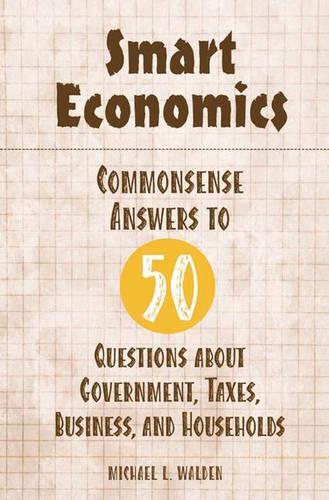
Smart Economics: Commonsense Answers to 50 Questions about Government, Taxes, Business, and Households
(Hardback)
Publishing Details
Smart Economics: Commonsense Answers to 50 Questions about Government, Taxes, Business, and Households
By (Author) Michael Walden
Bloomsbury Publishing PLC
Praeger Publishers Inc
30th August 2005
United States
Classifications
General
Non Fiction
Public finance and taxation
336
Physical Properties
Hardback
216
Description
Budget deficits, gas prices, health care costs, social security, job security. Anxiety over the economy pervades our daily livesfrom reports on the early morning newscasts to gossip around the water cooler to dinner table debate. Yet most citizens are woefully ignorant when it comes to understanding how the economy works and how to interpret the impact of policies and business decisions. It's easy to slip into generalities: government spending is wasteful, taxes are too high, good-paying jobs are being shipped overseas, Americans don't save enough. Other issues become hijacked by political partisans to advance their agendas: trade must be fair!, tax cuts will pay for themselves!, there will be no money left in the social security till after the baby boomers loot it! In Smart Economics, Michael Walden provides an antidote: take 50 of today's top economic issues and explain their meaning, implications, and potential solutions in a logical, straightforward, commonsense, and non-partisan way. Has Government Spending Been Out of Control Is Profit Bad Walden applies basic economic concepts and logical argumentation to help readers get their bearingsto separate fact from fiction and ultimately make better economic decisions themselves. The result is an entertaining and highly informative introduction to economic principles and their influence on our behavior. In Smart Economics, Michael Walden provides an antidote: take 50 of today's top economic issues and explain their meaning, implications, and potential solutions in a logical, straightforward, commonsense, and non-partisan way. From Has Government Spending Been out of Control to Is Profit Bad to Why Are Pro Sports Stars Paid So Much Walden demystifies the dismal science, using basic concepts and logical argumentation to help readers get their bearingsto separate fact from fiction and ultimately make better decisions, when it comes to spending, investing, saving, and voting. The result is an entertaining and informative introduction to economic principles and their influence on our behavior.
Reviews
Walden uses basic economic concepts and logic to examine the meaning, implications, and possible solutions to 50 current economic issues. Aimed squarely at the general reader, the book is organized as a series of questions with each two- to five-page chapter laying out the basic facts surrounding the issue and applying mainstream economic reasoning to explain those facts.Specific issues include budget deficits and the national debt, Social Security, outsourcing, the trade deficit, gasoline prices, sports franchises, immigration, poverty, and health care.Recommended. General readers; all levels of undergraduates. * Choice *
For readers with no background in economics or mathematics, Walden addresses some of the major economic questions in the news, not so much answering them as explaining the underlying issues and the criteria for making a decision. Among them are whether war helps the economy, whether Americans pay 60-80% of their income in taxes, whether low-paying jobs are replacing high-paying ones, and whether women earn less than men. * Reference & Research Book News *
[A]n entertaining and informative introduction to economic principles and their influence on our behavior. * Greater Hartford Business Times *
Author Bio
Michael L. Walden is Reynolds Distinguished Professor of Agricultural and Resource Economics, North Carolina State University, where he teaches courses in consumer economics, macroeconomics, microeconomics, and resource economics. He is the author of several books and over 200 academic articles, research monographs, conference presentations, and research reports on economic and consumer behavior. He writes and co-produces two radio programs, The Economic Perspective and The Economic Focus, writes the bi-weekly newspaper column, You Decide, and conducts public programs on issues of economic forecasting, behavior, and development.
